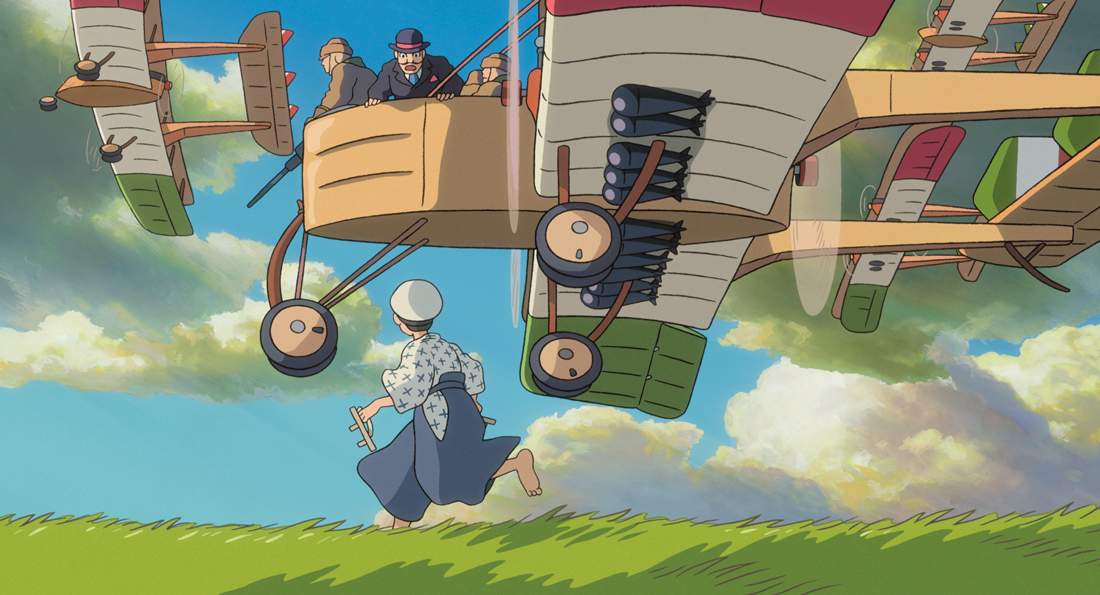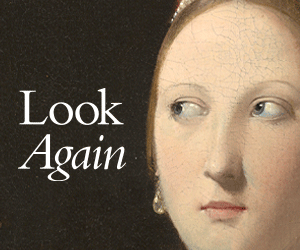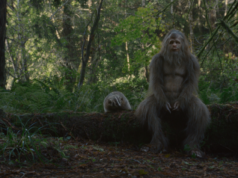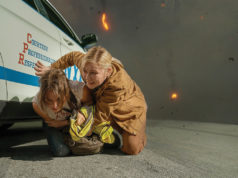I never took Hayao Miyazaki seriously when he claimed that The Wind Rises would be his last movie. It seems that the now-73-year-old director has a habit of announcing his retirement and then going back on it, and he has done the same thing this time out. I’ll believe that he’s out of filmmaking when he’s dead. (I’m taking the same approach with Steven Soderbergh, too.) We’re all fortunate that this giant of animated filmmaking remains with us to give us more wondrous works of art, and while his latest film may not be on the same level as his greatest masterpieces, it’s still a gift to treasure.
Like Miyazaki’s other films, this was originally done in Japanese but is being released in this country with American actors dubbing the dialogue in English. The story is a highly fictionalized account of the early life of aeronautical engineer Jiro Horikoshi (voiced by Joseph Gordon-Levitt). With his poor eyesight thwarting his childhood dream of flying airplanes, Jiro turns to designing them instead, throwing himself into his studies in the 1920s. He eventually lands a job at Mitsubishi, which is contracted to provide fighters and bombers to a Japanese military that’s gearing up to conquer the Pacific.
Some observers have accused this movie of soft-pedaling the damage and loss of life wreaked by Japan during World War II, which were undoubtedly aided by Horikoshi’s developments in aviation. It is indeed guilty of that, but that’s the point: Jiro is so wrapped up in his calculations and his dreams of flight that he’s well insulated from the consequences of his work. Yet we can see warning signs all around him. His engineer pal Honjô (voiced by John Krasinski) notes with some bitterness the irony of a poor country like Japan richly compensating them to design warplanes. When Jiro and Honjô travel to Germany to observe that country’s engineers, an evening walk of theirs is interrupted by Gestapo officers chasing some kid. Most unmistakably, at a resort hotel, a jovial German tourist (voiced by Werner Herzog) darkly warns Jiro that their nations are headed toward oblivion. Yet neither this nor falling foul of Japan’s secret police and being forced into hiding for reasons that he never understands manages to spur Jiro to take a hard look at who he’s working for.
For all this, Jiro isn’t depicted as some blinkered, misguided tragic hero. Miyazaki has always been enthralled by the idea of flight (a theme that has surfaced in many of his previous movies), and he revels in the creativity and extreme refinement of Jiro’s designs — you’ll learn more about flush riveting from this movie than you ever imagined. The flights of Jiro’s test planes are rendered with childlike exhilaration, as are Jiro’s dreams, in which he soars through the air on fantastical machines with his hero, the real-life aviation pioneer Giovanni Caproni (voiced by Stanley Tucci). Serving as Jiro’s benevolent angel, the Italian count compares the advent of aviation to humanity’s great monuments: “My planes will be used for death and destruction, but I prefer to live in a world with pyramids.” It’s an ethically complicated place that this movie leads us into, but Miyazaki has never been afraid of such places.
He doesn’t navigate the implications of this situation as smoothly as he could, and Jiro’s doomed romance with a physically fragile young woman (voiced by Emily Blunt, with an American accent to match the rest of the cast) isn’t well integrated into the story. Still, we get Miyazaki’s usual bounty of visual splendor, including a terrifying sequence depicting the Great Kanto earthquake of 1923, with the ground undulating like the water in a violently splashed tub. The lyricism is cut with humor, too, as Jiro’s short-statured, eternally cranky boss (voiced by Martin Short) provides both laughs and layered characterization. The literate script is also larded with references to Western culture — the title is taken from a poem by the French poet Paul Valéry, which is quoted in the movie’s epigraph.
All in all, Miyazaki’s continuing failure to find a large audience in America vexes me terribly, but if you’ve never seen his films, The Wind Rises isn’t a bad place to start. It doesn’t have the strangeness and grotesquerie of his other films like Spirited Away and Ponyo. Perhaps it could have used some, but in any event, it’s a transcendently beautiful work of animation genius tacked onto a gentle appreciation of its hero’s infinite ability to take pains.
[box_info]
The Wind Rises
Voices by Joseph Gordon-Levitt, Emily Blunt, and John Krasinski. Written and directed by Hayao Miyazaki, based on his own comic book and Tatsuo Hori’s short story. Rated PG-13.
[/box_info]












